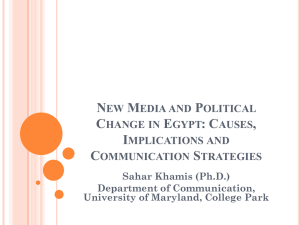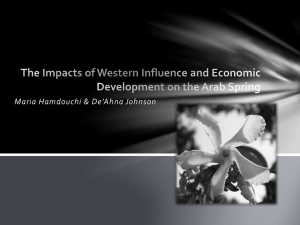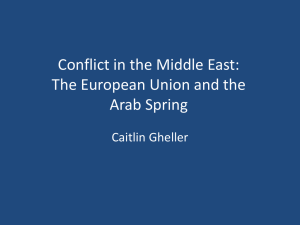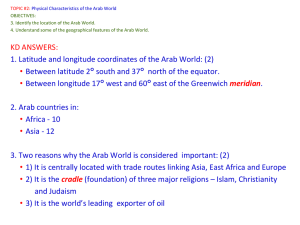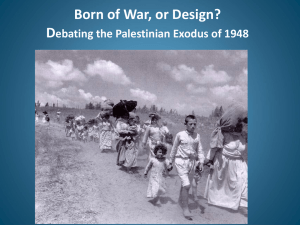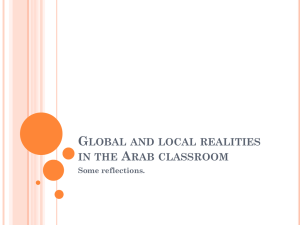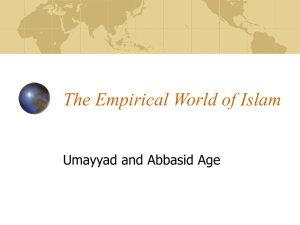Arab Open University Faculty of Computer Studies
advertisement
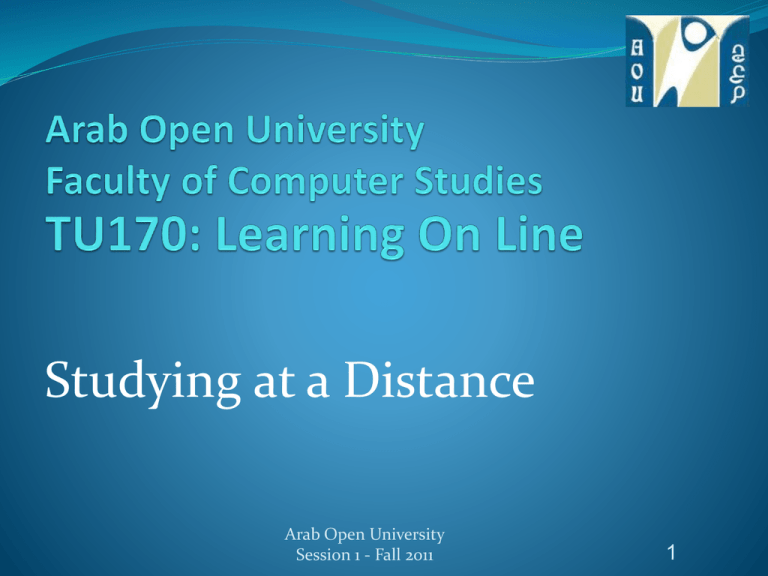
Studying at a Distance Arab Open University Session 1 - Fall 2011 1 Course Structure Selected topics from TWO textbooks will be covered in 6 sessions Studying at a Distance (Session 1) Computing Essentials 2012 (Sessions 2- 6) There will be Lab sessions to practice some general skills Arab Open University Session 1 - Fall 2011 2 Course Assessment Continuous assessment (50%) One TMA (Tutor Marked Assignment) == 20% One MTA (Mid-Term Assessments) == 30% Final Exam (50%) To pass the course, YOU NEED to get at least: 15 % in continuous assessment 20% in Final Exam 50 % of the total mark. Arab Open University Session 1 - Fall 2011 3 Course Objectives To develop basic skills of “Learning” To know e-Learning: meaning, accessibility, skills, and resources To familiarize with the basic concepts of Information Technology: Internet, Web, and Systems To familiarize with basic computer system applications: software and hardware To learn some practical skills for using computers To introduce the concepts of: Security and Ethics Arab Open University Session 1 - Fall 2011 4 Session 1: Outline What is Learning? What do we mean by e-Learning? Reading and note-making LMS at AOU Arab Open University Session 1 - Fall 2011 5 What is Learning? Acquisition of new skills, knowledge and attitudes Recognition of how they relate to the skills, knowledge and attitudes you already possess Process of understanding what has been acquired, and applying it to both familiar and new situations It is NOT just about collecting information It is engaging with and making use of that information in a creative way! (Active learning) Arab Open University Session 1 - Fall 2011 6 Different Learning Concepts Different Learning Concepts Traditional learning Distance learning: student is geographically remote from the educational institution (same skills + computer skills) ‘Hybrid', ‘Blended' or ‘Mixed-mode‘ learning: includes a combination of both face-to-face and distance study Arab Open University Session 1 - Fall 2011 7 Sources of Learning Reading books and articles found by searching library resources Accessing information on a CD-ROM or via the Internet Accessing information from professional associations Discussing subjects with tutors and other students, either face-to-face or via the Internet Attempting problem-solving Arab Open University Session 1 - Fall 2011 8 What Do We Mean by e-Learning Using computers and mobile phones CD-ROM or DVD Internet E-mailing One-to-one chat Virtual Learning Environment (VLE) Conferencing boards Discussion rooms Streaming video Video conferencing Podcasting Blogs Wikis RSS(Really simple syndication) Arab Open University Session 1 - Fall 2011 10 • Virtual Learning Environment(VLE): Computer environment which provide access to a variety of electronic learning resources. Eg: Moodle, Blackboard • Conferencing boards(Discussion rooms): Places where discussions can held. People can respond to questions or comments posted by others • Podcasting: Delivery of multimedia files via the internet to a PC or mobile phone • Blogs: A personal website which can be open or password protected • Wiki: A website where several people can participate to write the content for a subject • RSS(Really simple syndication): An automated system of receiving notifications when webpages are updated (downloaded software) • Video conferencing: Communication between different locations by transferring audio & video • Video streaming : No need to download a file to play it. We can view video in real time Online learning: VLE have the following information: Program and module information Assessment details The facility to submit assignments Schedule of learning Interactive e-learning materials Opportunities for self-assessment questions (SAQs) and feedback ((self- assessment-> for you to know your level not to judge your-self) University staff information and contact details Arab Open University Session 1 - Fall 2011 12 Reading and Note-making Read with a purpose Read selectively Read critically and analytically Arab Open University Session 1 - Fall 2011 13 Reading and Note-making: Relevance Find what relevant items of literature and electronic sources with the help of catalogues, indexes, abstracts (Is it worth to spend more minutes on this martial?) Put yourself into a questioning frame of mind Why am I interested in this item? How will it contribute to my essay, assignment, or group work preparation? Arab Open University Session 1 - Fall 2011 14 Reading Strategies [1] Read the dust jacket or back cover of a book Cover can provide a useful indication of its overall relevance to your need Author Their standing in the academic community Their qualifications for writing the book Their contribution to a particular field Arab Open University Session 1 - Fall 2011 15 dust jacket Dust jacket dust jacket 16 Arab Open University Spring 2013 Reading Strategies [2] Read the Abstract It is likely to be more informative than a book cover. provide an accurate, brief account of what is in the article What methodology was used The main conclusions. Arab Open University Session 1 - Fall 2011 17 Reading Strategies [3] Read the Content page Select only the relevant chapters, sections, or even few pages Scan the index of a book for appropriate or relevant vocabulary (pointer-locator) Provide an overview of the key concepts Scan the bibliography to recognize some of the references Arab Open University Session 1 - Fall 2011 18 Reading Strategies [4] Read the Introduction Gives an idea of the author's point of view or perspective on the subject of the book Read the Conclusion This can sometimes the final chapter of a book It is like a summary and may contain final thoughts, future improvements and author’s opinion. Arab Open University Session 1 - Fall 2011 19 Reading Strategies [5] Read the first and last paragraphs of a chapter and read the first and last sentences of a few other paragraphs Scanning is used when you look quickly down a page or website for specific words or phrases which you want to find Skimming is used when you are not looking for anything in particular, but want to get a general impression of the writing, and to discover what keywords, phrase or arguments have been used by the writer Arab Open University Session 1 - Fall 2011 20 Reading Strategies [6] Start a mind map or spider diagram before progressing to the more in-depth stages of reading This involves noting down the keywords for the knowledge gained from reading up to this point Can make your reading from now on faster and more effective (visually outline information) Arab Open University Session 1 - Fall 2011 21 Reading Strategies [7] Mind map example: Essay title: ‘Identify and explain the major classifications of company information required by users. Outline the reports typically required by various types of users, justifying your linkages.’ Arab Open University Session 1 - Fall 2011 22 Reading Strategies [8] Mind map example Arab Open University Session 1 - Fall 2011 23 Reading Strategies [8] Arab Open University Session 1 - Fall 2011 24 Critical and Analytical Reading [1] Stop and think from time to time about what have been read Consider whether or not agree with it or believe it to be based on sound evidence Employ the tactic of Double reading First do a quick read of the page, or several pages, to get the gist of what is being said Second, go over the content much more carefully and make notes on the key points as you go Arab Open University Session 1 - Fall 2011 25 Critical and Analytical Reading [2] Compare different points of view that are presented in different books and articles to make judgments about what being said Arab Open University Session 1 - Fall 2011 26 Critical and Analytical Reading [3] Academic criticism Criticism in general terms is regarded as something negative In academic context, criticism does not have to imply negatively, it is an opportunity to state what is good about something too Should not be interpreted as a rude, personal insult on the author Arab Open University Session 1 - Fall 2011 27 Note-making [1] Highlight Write in margins or underlining Make sure not to break the copyright of the copied or printed materials Read through a section at a time Think about it Write a brief summary in your own words Check you have listed points in logical order Arab Open University Session 1 - Fall 2011 28 Note-making [2] Re-read the original work to check not missing out anything important Create your summary using a mind map rather than by writing a paragraph of text Try to discard irrelevant material Record the full bibliographical details of the item you read Write the author, date Title of the item Arab Open University Session 1 - Fall 2011 29 Plagiarism [1] Plagiarism: is taking and using another person’s published thoughts or writings as your own Use quotation Sometimes plagiarism can be unintentional, in the sense that you forget to cite the source In many institutions “I forgot to quote” does not constitute an acceptable defense and you would still suffer the consequences! Arab Open University Session 1 - Fall 2011 30 Plagiarism [2] Even when not quoting an author verbatim, you should acknowledge the source of ideas, evidences or theories to which refer in the text of your essays NOTE Don’t let your essay or other written work become just a series of quotes You have to explain in your own words why the quote is relevant to the essay and how it supports your own reasoning Arab Open University Session 1 - Fall 2011 31 LMS at AOU [1] The LMS stands for Learning Management System It is the system that you need to manage your studying process with the Arab Open University To access the LMS, use your web browser to go to the following address: http://lms.arabou.edu.sa Note: the URL may change according to your branch Arab Open University Session 1 - Fall 2011 32 LMS at AOU [2] The TU170 page has the following sections: Tutor’s Office Hours: to see the time and date where you can meet the tutor TMA’s : here you can download and upload the TMA and check the TMA result Course Content: to download any electronic material, summaries, notes, and power point slides for the course External resources: any external resources such as webpage, PDF files or links to online tutorial which can help during the study Arab Open University Session 1 - Fall 2011 33 • Enter your student’s ID and Password Login Arab Open University Session 1 - Fall 2011 34 Arab Open University Session 1 - Fall 2011 35 • Click on “Profile” Arab Open University Session 1 - Fall 2011 37 • Click on “Edit profile” Edit profile Save updates Arab Open University Session 1 - Fall 2011 38 • Click on “Change password” Arab Open University Session 1 - Fall 2011 39 • How to send a message to your tutor Arab Open University Session 1 - Fall 2011 40 • Click on “Send message” button Arab Open University Session 1 - Fall 2011 41 • Type your message and send it Arab Open University Session 1 - Fall 2011 42

